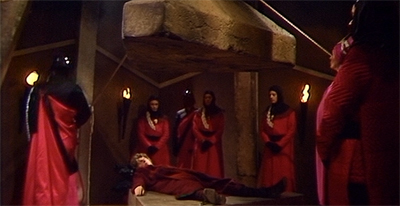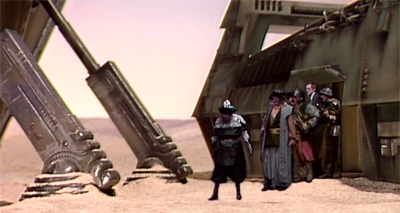To celebrate the fiftieth anniversary of the longest-running science-fiction show in the world, I’ll be taking weekly looks at some of my own personal favourite stories and arcs, from the old and new series, with a view to encapsulating the sublime, the clever and the fiendishly odd of the BBC’s Doctor Who.
Meglos originally aired in 1980.
To control the output, it will be necessary to increase the violence of the emissions.
Then you’ll be in danger yourself.
Well, hardly. I’m a Time Lord. Having lived in the future I can hardly die in the present.
That can’t be true. That’s a philosophical paradox.
No, it’s merely beyond your comprehension.
– Meglos and Deedrix get their “parody” on
Meglos is one of those stories that has undergone something of an alternative interpretation among Doctor Who fans. Much like The Web Planet went from “a brave attempt to realise a truly alien world” to a “complete and utter embarrassment”, Meglos has gone from “that episode where a talking cactus tries to take over the universe” to “that parody where a talking cactus tries to take over the universe.” In fairness, looking at the serial, it is very hard not to see Meglos as an intentional and subversive parody of a bad Doctor Who story, but I have to concede that it doesn’t stop the adventure from being a bad Doctor Who story itself.
Poe’s Law states that’s often impossible to distinguish a sincere expression of fanaticism from a parody of a sincere expression of fanaticism. It holds true for Meglos, to a certain extent. While various elements of the story – the terrible wigs, the plant with ambitions of universal conquest, the shallow debate between religion and science – might have seemed like obvious parody in any other context, it’s somewhat hard to see that in the context of a series that has in the past, and would in the future, use these elements in absolute earnest. After all, killer plants were an element of Seeds of Doom and Terror of the Vervoids, any number of costuming choices over the decades have been fairly gnaff, and not all conflicts between the rational and irrational over the fifty-year history of the series have been well-handled. So you could be forgiven for assuming that a bunch of writers and producers had assembled these elements without a hint of humour, intending for the elements to be played entirely seriously.
However, it’s hard to dismiss the idea that Meglos was intended as a send-up of the popular perception of Doctor Who, taking any number of ridiculous and familiar concepts, but pushing them out into the realm of the ridiculous. The problem, of course, being that the show lives well beyond the realm of the ridiculous. Take the villain himself, the strange cactus named Meglos. Now, there have been plant villains before, but none have seemed quite so meglomaniac. He spouts clichés like “ah! ah, you’ve served me well, General Grugger!” while putting a little extra emphasis on his “r”s, having mastered the art of villainous enunciation.
The villain is a huge cliché, prone to giving long speeches and having the occasional dramatic mental breakdown – in a nice touch, the character’s dramatic mental breakdown actually affords his hostage the time to arm herself, seemingly to point out that characters rarely capitalise on these moments of scenery-chewing nonsense. Hell, it’s implied Meglos doesn’t even have a proper motivation for wanting to take over the galaxy. When prompted for a reason, he dismissively suggests, “It’s beyond your comprehension.” It’s worth noting that’s the answer he gives when he doesn’t have an answer. He’s a very parody of a Doctor Who villain, one with grand plans, but little actual character, and a truly strange back story.
I do kinda like the “chronic hysteric loop”, which feels like a bit of a joke around the techno-jargon the show occasionally uses to increase dramatic tension. Indeed, the look of horror on the faces of the regulars as they repeat the nonsensical techno-babble is priceless – as is the fact that a “chronic hysteric loop” is essentially a problem that our heroes can only escape can only escape through the power of acting… badly. Indeed, Romana ends up feeding the Doctor his lines. is it wrong that it seemed like a good-natured joke at the expense of all those ridiculous moments where the leads were asked to convince the audience that an obviously ridiculous threat was real? In particular, Jon Pertwee wrestling a giant tentacle in Spearhead from Space comes to mind.
Speaking of mocking the show’s usual threats, it’s hard to take the plants that hassle Romana particularly seriously, especially as they conjure the imagine of the nubile young companion thrashing against obviously rubber tentacles. It’s very telling that, once Romana has lured the men chasing her into a field of the “dangerous” plants, the actors respond by flailing wildly… until they get bored of all this and just sort of amble out in their own time. There’s no way that those scenes were intended to be serious, even though it’s a bit of a shame to see Romana reduced to an idiot for a cheap joke. “Partial incineration of vegetation evident,” K-9 observes, prompting the Time Lady to respond, “Nonsense, K-9. These leaves are burnt.” Yes, Romana is now too dumb to understand the word ‘incineration.’
The population of this alien world seems like a parody of the types of aliens you’d see during the Hartnell or Troughton era, with the planet divided along the lines of science and faith. Dodgy blonde wigs are flowing robes are the order of the day, as are token science-fiction terms like “Savant.” The script gives the inhabitants of this alien planet all manner of dodgy dialogue and it’s hard to believe that anyone could have intended it be taken seriously. “Faith!” one character insists. “That word again! What we need is knowledge!”
Then there’s the purple prose that seems like a parody of stilted dialogue: “What was it like? Oh yes, we can define its shape and size and colour, and from up there we could estimate its output, but what do we really know about it?” And the awkward exposition that can’t have been written in good faith: “The source of all our energy, the heart of our civilisation, a device we’ve become totally dependent upon, and all we know about its internal structure are a few vague theories.” It gets so bad that even her colleague interrupts her with a dismissive, “Yes, yes, I know.”
The problem is that it’s entirely possible that any one of these moments could have occurred completely unintentionally as a result of genuinely bad writing or bad direction. It’s also possible that the series could have played a number of these sequences straight. Consider, for example, the sequence towards the end of the final episode where the Doctor distracts a guard by asking, “Ah, er, would you say this was vertical?” It isn’t as though the character hasn’t distracted a guard with some less fanciful work in the past. When Brotadac and Grugger look around Meglos’ chamber at the “valuables” (which are just some really gnaff kitchen utensils), it’s more than possible that we’re being asked to honestly suspend our disbelief and pretend that it isn’t merely a collection of cheap homeware painted white.
However, there’s also the fact that just enough of the serial is done well enough that it seems the cast and crew were trying to make something of the mess. After all, the CSO work creates the impression of a set several times larger than our actors, the make-up on Meglos is impressive and Tom Baker puts in a great performance. Even Brotadac, whose name is – as has been pointed out repeatedly – an anagram of “Bad Actor”, is played by a strong supporting cast member. There are serials that have emerged looking a lot cheaper and a lot sillier than this, despite the best efforts of the script. I think that’s the fundamental problem with Meglos, even if you buy into the “parody” argument.
It’s a shame, because there are several good elements, even if they don’t really add up to much. The idea that the Doctor is getting older is really hammered home here. Baker’s energetic portrayal of Meglos demonstrates that it isn’t an underlying lack of enthusiasm, but an attempt to portray a character who is getting on in years. There are a few moments near the start, with Romana, when it seems like the Doctor is struggling to keep track of everything “Well, of course I’ve been to Tigella,” he states after initially denying it. He then seeks some clarification, “Did you say Tigella?” Baker looks skinny and old, worn out. While you never would have guessed it in City of Death or even The Horns of Nimon, Baker had been doing this role for six years. Now you feel every day of it.
And then there’s Baker as Meglos. Baker does a great job of making Meglos’ impersonation of the Doctor quite distinct from the Doctor himself. It’s a fun performance that shows the actor is still enjoying what he’s doing, and that Tom Baker was a far better actor than his detractors give him credit for. I have to say, between The Leisure Hive, the imposter here and arguably the Watcher in Legopolis, I do like the recurring imagine of multiple Doctors in this final season – each imitation of the Fourth Doctor fading away before the real Fourth Doctor himself must exit stage left.
Meglos is also notable for the casting of Jacqueline Hill, one of the first companions, in another role. While a whole bunch of companions have appeared on the show before getting the part (Peter Perves, Ian Marter, Freema Agyeman and Karen Gillan come to mind), this is the first time a companion has returned in a different role. It’s strange, because it feels kinda pointless, with only one line paying off (“I know who you are!”). In many ways, it feels like the start of the stunt-casting that many would come to associate with the Nathan-Turner era. It feels like a bit of a waste.
Which, in fairness, just about sums up Meglos as a whole. It feels like an interesting combination of ideas, but one that doesn’t really work because those making it were as confused as those who would ultimately end up debating an analysing it over thirty years later. Still, part of me admires the audacity of it all, even if I can’t see myself watching it again any time soon.
Well, we’ll see about that when we’ve dropped our friend off home. Unless, of course, you want to stay here and do some gardening?
Maybe I will. I’ll be in trouble back home.
Oh?
I told the wife I’d be in from work in twenty minutes.
Well, don’t worry about that. We can get you back before you leave.
Oh, good.
– the Doctor and the Earthling
Filed under: Television | Tagged: bbc, cactus, decay, doctor, doctor who, DoctorWho, entropy, Gallifrey, Jon Pertwee, Meglos, parody, Romana, tardis, Time Lord, Tom Baker, Web Planet |



























Reblogged this on queenofshebaformulary.
Thanks for the reblog!
Reblogged this on queenofshebaformulary.